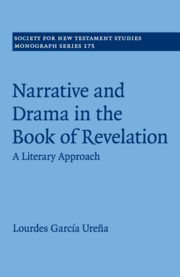Book contents
- Narrative and Drama in the Book of Revelation
- Society for New Testament Studies:
- Narrative and Drama in the Book of Revelation
- Copyright page
- Dedication
- Contents
- Tables
- Preface
- Abbreviations
- Introduction
- 1 The Literary Forms of the Book of Revelation
- 2 John, Eyewitness and Herald of the Visions
- 3 John, Auditory Witness and Herald of the Word
- Epilogue
- Bibliography
- Index of Ancient Sources
- Subject Index
Epilogue
Published online by Cambridge University Press: 15 August 2019
- Narrative and Drama in the Book of Revelation
- Society for New Testament Studies:
- Narrative and Drama in the Book of Revelation
- Copyright page
- Dedication
- Contents
- Tables
- Preface
- Abbreviations
- Introduction
- 1 The Literary Forms of the Book of Revelation
- 2 John, Eyewitness and Herald of the Visions
- 3 John, Auditory Witness and Herald of the Word
- Epilogue
- Bibliography
- Index of Ancient Sources
- Subject Index
Summary
Throughout this book, I have disassembled the book of Revelation line by line in search of the principles that underlie its organization. The Epilogue is the moment to reassemble it and verify the model of reading. The result is positive, and it is concluded that the narrative form of Rev 1.9–22.16 is analogous to the short story form as it has developed since the nineteenth century. The principal argument put forward in this book is that one of the singular characteristics of this form is its emphasis on the reader or listener. Revelation also coincides with the short story form in that it features a wide range of characters whose adventures are woven into a plot charged with successive waves of tension and relief that lead eventually to a happy ending. Lastly, there are similarities in the techniques employed: flexibility in the use of space–time coordinates and the intensive use of descriptive adjectives that simultaneously sway the emotions of the reader/listener and provide clues as to the goodness or wickedness of the characters portrayed.
Keywords
- Type
- Chapter
- Information
- Narrative and Drama in the Book of RevelationA Literary Approach, pp. 188 - 190Publisher: Cambridge University PressPrint publication year: 2019

